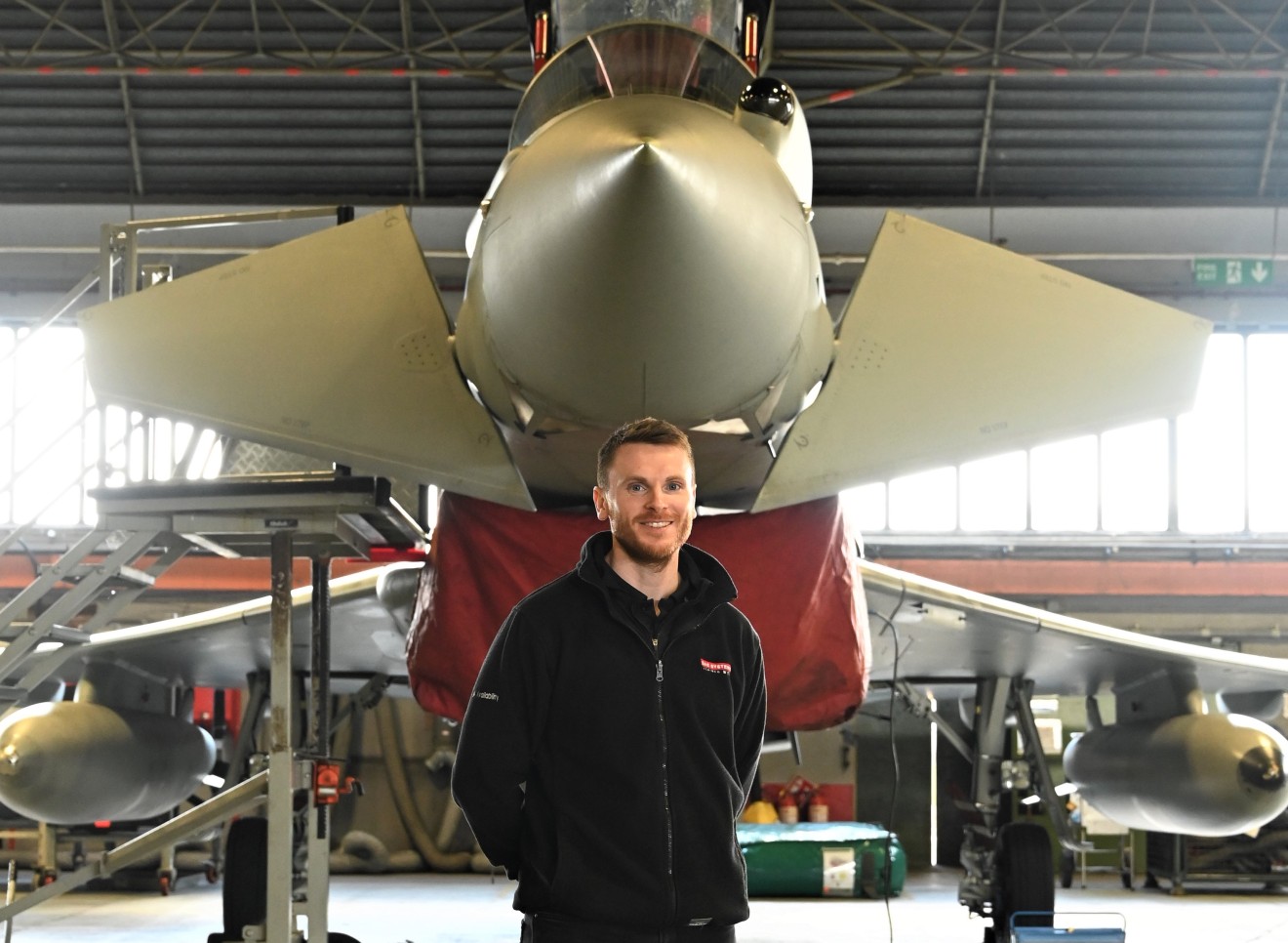Tell us something about the career path that has led you to this role?
I joined BAE Systems in 2010 to start my apprenticeship, which I completed at the company’s training academy at Robin Hood Airport in Doncaster. I was on one of the company’s first courses. Following that I moved to RAF Marham as an operator working on the Tornado GR4 on both the mechanical and engine teams. Then I came to RAF Coningsby and I’ve worked up through the ranks to Team Leader.
What are the highlights so far?
I’ve spent some time at RAF Lossiemouth in a supporting role carrying out modifications and support to forward tasks and I’ve had two trips to the Falkland Islands. My first trip there was for six month and I worked as the Primary Maintenance on the 1435Flt aircraft based on the islands. I returned a second time to carry out a modification programme.
I enjoyed living down there, it was a great experience not many people have. It was also challenging mainly due to the remoteness and isolation from the modern lifestyles we all now have.
What does your current role involve?
Day to day we carry out scheduled maintenance, servicing activities and fault diagnosis. I run one of the maintenance teams, made up of both avionics and mechanical engineers. I support my team by running the maintenance plan, ensuring they they've got the tools, equipment and information to carry out the work safely and to the high standards required.
Another part of the role is raising technical queries through to the RAF’s Technical Service Centre (TSC) and liaising with all other stakeholders.
What are the skills that you need?
Teamwork is a crucial one. You need to be able to work with ,not only your own maintenance team, but also the wider community and all the different stakeholders. Information needs to be readily available to make sure that everybody is working towards the same end goal, whilst understanding each others challenges and issues.
You need engineering, maintenance and product knowledge too, so you can execute the maintenance planning to minimise any risk and improve safety.
Communication is key to succeed. You need to be able to give out and receive instructions and feedback, making sure that everybody understands and is aware.
And finally, you need people skills. Interaction and engagement are essential to bring out the best in others. With the diversity of employees, customers and visitors and you have to consider the huge variation of backgrounds, cultures, experience and knowledge.
What pressures and challenges do you face?
No two days are really the same and there are different challenges every day. Within this area of the business we must challenge and ensure we comply with all regulations and maintain a safe working environment.
There is the constant demand from the customer, they want the next jet off the line. Recent NATO requirements have meant an increase in flying requirements. Fleet plans are always changing. That’s the forever challenge for us and it takes a lot of skill and knowledge to be in a position where we can achieve what we need to do.
Because of the complexities of the aircraft systems and the sheer volume of tasks that we deal with, teaching and developing new employees can also be challenging.
What makes the role so enjoyable?
It’s where all the ends of the TyTAN enterprise come together, working through the challenges and frustrations we get to see the finished product delivered back to the customer. The work is very varied, and you get a huge sense of achievement and satisfaction on each delivery.
Also, this position offers a lot of different opportunities going forward.
Who has inspired you during your career?
When it came to my actual apprenticeship it was my family. They’ve a background in engineering and saw this role as a real opportunity. In the working environment it has been various managers, supervisors, colleagues that have helped along the way, offered support and given me the knowledge to make the right decisions.
I get a huge sense of achievement and satisfaction when a maintenance is completed and the aircraft returns to the customer. You get to see them fly.
Working side by side with your RAF colleagues, do you feel part of that mission?
Yes, because we’re working as a team. You do feel directly involved with what it is they are trying to achieve.
The work we do is significant. We are supporting the customer to fulfil their flying requirements and then we’re ensuring that airworthiness is continued. On top of that we are also providing a continued support and availability service.
I get a huge sense of achievement and satisfaction when a maintenance is completed and the aircraft returns to the customer. You get to see them fly. When you see them at events such as air shows, it’s nice to know that you've worked on them and maintained them.
But it is also great to hear feedback from the squadrons who are using the jets for what they are designed for, and to hear they're performing well and they are able to carry out their operations. From the company side I know that going forward, as a result of what we are doing now, we are displaying what we are capable of for future contracts.
What does the future hold for you?
I’m still on a journey which I think has just begun. I’ve got new goals I want to achieve. I want to carry on, learn more, grow as a person and gain more experience.
